2011【最给力版】中考英语语法总复习笔记【最权威版】【最提分版】
中考英语语法总复习(外研社版)史上最全

外研社初三英语语法总复习名词一、名词的分类:根据用法,名词可以分为可数名词和不可数名词两类。
1.可数名词有单、复数形式的区别。
需要掌握规则名词的复数形式的构成。
*以y结尾的专有名词,或元音字母+y 结尾的名词变复数时,直接加s变复数:如:two Marysthe Henrys monkey---monkeysholiday---holidays比较:层楼:storey ---storeys story---stories*以o 结尾的名词,变复数时:a. 加s,如:photo---photospiano---pianos radio---radioszoo---zoos;b. 加es,如:potato--potatoestomato--tomatoes hero--heroes Negro--Negroes*以f或fe 结尾的名词变复数时常去f , fe 加ves ,如:half---halvesknife---knivesleaf---leaveswife---wiveslife---lives thief---thieves2.名词复数的不规则变化1)child---children foot---feettooth---teeth mouse---miceman---men woman---women 注意:与man 和woman构成的合成词,其复数形式也是-men 和-women。
如:an Englishman,two Englishmen. 但German不是合成词,它是由Germany去y变化而来,故复数形式为Germans;Bowman 是姓,其复数是the Bowmans。
2)单复数同形如:deer,sheep,fish,Chinese,Japanese ,jin,yuan,two li,three mu,four jin 但除人民币元、角、分外,美元、英镑、法郎等都有复数形式。
初三英语语法知识点归纳
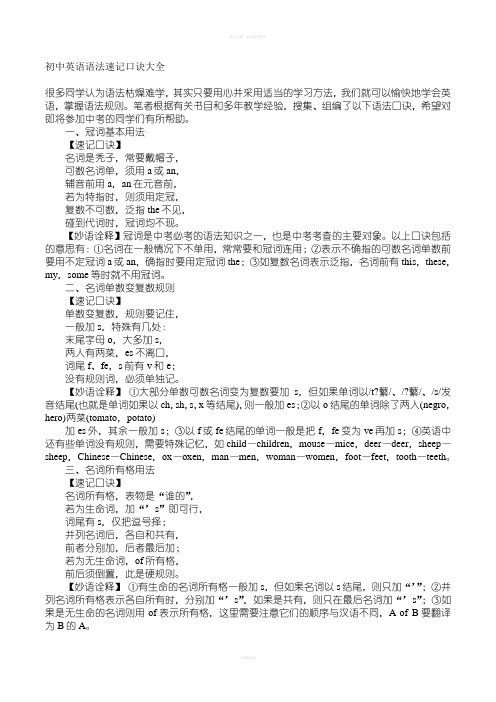
初中英语语法速记口诀大全很多同学认为语法枯燥难学,其实只要用心并采用适当的学习方法,我们就可以愉快地学会英语,掌握语法规则。
笔者根据有关书目和多年教学经验,搜集、组编了以下语法口诀,希望对即将参加中考的同学们有所帮助。
一、冠词基本用法【速记口诀】名词是秃子,常要戴帽子,可数名词单,须用a或an,辅音前用a,an在元音前,若为特指时,则须用定冠,复数不可数,泛指the不见,碰到代词时,冠词均不现。
【妙语诠释】冠词是中考必考的语法知识之一,也是中考考查的主要对象。
以上口诀包括的意思有:①名词在一般情况下不单用,常常要和冠词连用;②表示不确指的可数名词单数前要用不定冠词a或an,确指时要用定冠词the;③如复数名词表示泛指,名词前有this,these,my,some等时就不用冠词。
二、名词单数变复数规则【速记口诀】单数变复数,规则要记住,一般加s,特殊有几处:末尾字母o,大多加s,两人有两菜,es不离口,词尾f、fe,s前有v和e;没有规则词,必须单独记。
【妙语诠释】①大部分单数可数名词变为复数要加s,但如果单词以/t?蘩/、/?蘩/、/s/发音结尾(也就是单词如果以ch,sh,s,x等结尾),则一般加es;②以o结尾的单词除了两人(negro,hero)两菜(tomato,potato)加es外,其余一般加s;③以f或fe结尾的单词一般是把f,fe变为ve再加s;④英语中还有些单词没有规则,需要特殊记忆,如child—children,mouse—mice,deer—deer,sheep—sheep,Chinese—Chinese,ox—oxen,man—men,woman—women,foot—feet,tooth—teeth。
三、名词所有格用法【速记口诀】名词所有格,表物是“谁的”,若为生命词,加“’s”即可行,词尾有s,仅把逗号择;并列名词后,各自和共有,前者分别加,后者最后加;若为无生命词,of所有格,前后须倒置,此是硬规则。
中考英语语法专项复习副词精讲精练打印讲义学霸笔记
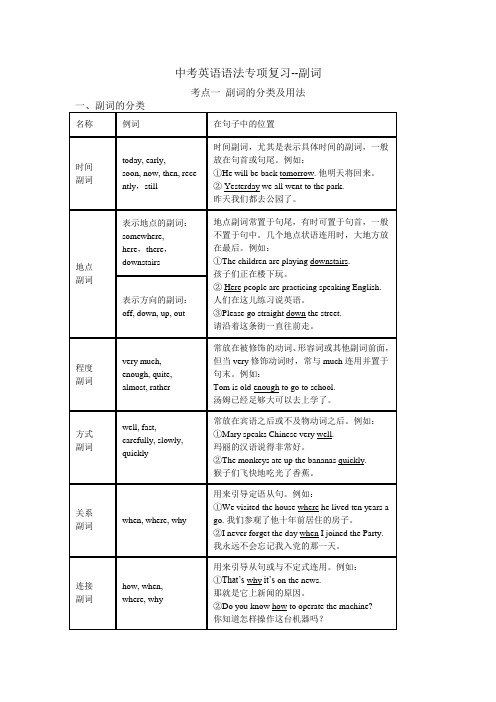
中考英语语法专项复习--副词考点一副词的分类及用法形容词变为副词1. 一般直接加-ly:quick―quickly; bad―badly2. 个别以e结尾的去e加-ly:true―truly3. 以y结尾且发音为[i]的把y变为i再加-ly;若读音为[ ],则直接加-ly:happy―happily; heavy―heavily;angry―angrily; shy―shyly; dry―dryly4. 结尾是辅音字母加le的形容词去e加y:terrible―terribly; possible―possibly; probable―probably二、副词的用法1. 作状语(1)用来修饰形容词、副词,通常放在所修饰词之前(enough放在所修饰形容词的后面)①The girl is really clever .这个女孩确实聪明。
②Yao Ming is tall enough to touch the basket.姚明足够高能够触到篮筐。
(2)副词修饰动词时,一般放在被修饰词之后;very,quite不能修饰动词;方式副词放在句尾Kobe plays basketball very well .科比打篮球非常好。
(3)位于句首,修饰整个句子Luckily, he was not hurt badly.幸运的是,他伤得不重。
2. 作定语一般放在所修饰词之后The people here are very friendly. 这儿的人很友好。
3. 作表语放在系动词之后I must be off now.现在我必须走了。
考点二副词的比较等级1. 一般副词在词前加more/most变为比较级/最高级。
clearly —more clearly—most clearly;easily—more easily—most easily2. 少数既可作形容词也可作副词的在词尾加-er/-est。
hard—harder—hardest; fast—faster—fastest3. 副词比较等级的使用类似于形容词的比较等级用法,但副词最高级前一般不用定冠词the。
2011最新中考英语知识总结(详细)

2011最新中考英语知识总结(本资料为特级教师原创)(一)形容词和副词I.要点A.形容词1、形容词的用法形容词是用来修饰、描绘名词的,通常在句中作定语、表语或宾补,有时还可作状语。
如:He is honest and hardworking.I found the book interesting.某些形容词与定冠词连用表示一类人作主语时,谓语通常用复数形式。
如:The rich and the poor live in different parts of the city.The English like to be with their families.多个形容词作定语修饰名词的顺序:冠词+序数词+基数词+性质状态(描述性)+形状大小+新旧老少+颜色+国籍+材料+名词。
如:the second five interesting big new red Chinese wall papers.2、形容词比较等级的形式(1)规则形式一般说来,单音节词及少数双音节词在后加-er; --est 来构成比较级和最高级;其他双音节词及多音节词在前加more, most.如:great-greater-greatestbusy-busier-busiestimportant-more important-(the)most important(2)不规则形式good (well)-better-bestbad (ill)-worse-worstmany (much)-more-mostlittle-less-least(3)形容词比较等级的用法①表示两者的比较,用形容词的比较级+than. 如:He is cleverer than the other boys.This one is more beautiful than that one.②表示两者以上的比较,用"the +形容词最高级(+名词)+of(in) …"如:He is the cleverest boy in his class.③表示两者是同等程度,用"as +形容词原级+as". 如:He is as tall as I.I have as many books as you.④越…越…例如:The more I learn, the happier I am.⑤ You can never be too careful. 越小心越好又如:You can never praise the teacher too highly.你怎么赞扬这个老师也不过分。
中考英语语法专项复习动词与时态精讲精练打印讲义学霸笔记

中考英语语法专项复习--动词及时态动词短语常见以下六种类型:1. 动词+介词,宾语位于介词后。
例如:look for; listen to; talk about/with; think about2. 动词+副词,代词作宾语时须用“动词+代词+副词”形式;名词作宾语可以在副词前,也可在副词后。
例如:turn on/off/ up/down; pick up; call up; take out3. 动词+副词+介词,宾语位于介词后。
例如:come up with; run out of; get on/along with4. 动词+名词+介词,宾语在介词后;名词前可以加形容词限定。
例如:take (good) care of; take pride in; pay (more) attention to5. 动词+名词(后无宾语)。
例如:take place; lose heart6. be+形容词+介词,形容词前可加程度副词。
如very等。
例如:be proud of; be angry with; be interested in考点二动词的时态二、时态的应用及动词变化形式1. 一般现在时【巧学妙记】学习一般现在时,基本用法要熟悉。
表示动作常发生,特征性格和能力。
存在状态和习惯,客观事实与真理。
如果主语是单三,谓语就要变一变。
2. 一般过去时(1)一般过去时的用法①表示过去某个特定时间发生的动作或存在的状态。
通常与yesterday, last year, in 1976, a few months ago等表示过去的时间状语连用。
例如:I met him in the street yesterday.昨天我在街上遇到他了。
②表示过去某一段时间内经常或反复发生的动作。
通常与often, usually, seldom等表示频度的副词连用,但这种用法是以一个过去时间为前提的。
例如:He often went to school by bus last term.上学期他经常乘公共汽车去上学。
人教版2011课标版——中考英语语法复习

后面跟可数名词
后面跟不可数名 词
one, that 和 it 在用法上的区别: one 泛指,指所指的名词中的一个,that 和
it 表示特指。 that 与所指的名词为同类,但是不是同一
个;而 it 与所指名词为同一个。 如:My color pen is broken, do you have
some
any
相同点 可以修饰可数和不可数名词
不同点 多用于肯定 多用于否定句、
句中
疑问句和条件句
中
例如:
1 I have some books, but I don’t have any story books. 我有一些书,但我没有故事书。
2 Is there anything interesting in today’s newspaper ? 今天的报纸上有什么有趣的内容吗?
如:hundreds of 成百上千的
three million 三百万
时间和日期的基本表达法 1 用基数词表示时间,两种表达法如下: * 直接读数字。 如:
2:35 two thirty-five, 3:30 three thirty * 用past/to 表示“过几分”/ “差几分到 下一个点”。 如:2:35 twenty-five to three
2. I have two sisters. One is a teacher,
______ is a doctor.
A. other
B. another
C. others
D. the other
解析:(两个中的)一个…另一个…,使用 如下短语:one…, the other….因此答 案为D。
【中考英语复习之语法过关】课时07 特殊句(1倒装句 2祈使句 3感叹句 4附加疑问句)(教师版)
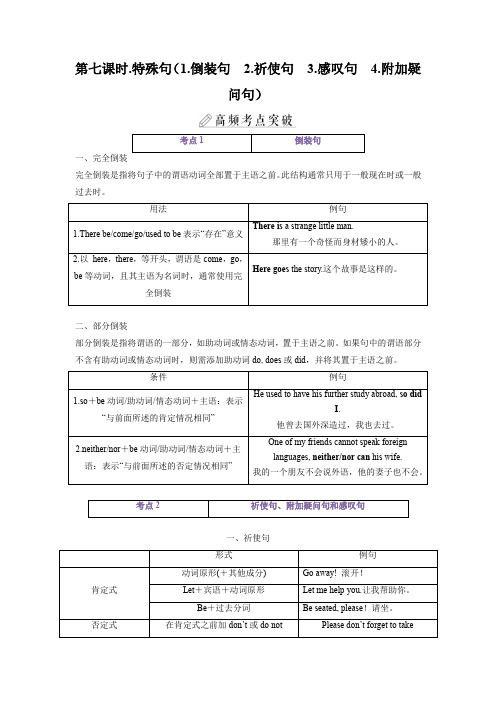
第七课时.特殊句(1.倒装句 2.祈使句 3.感叹句 4.附加疑问句)一、完全倒装完全倒装是指将句子中的谓语动词全部置于主语之前。
此结构通常只用于一般现在时或一般过去时。
部分倒装是指将谓语的一部分,如助动词或情态动词,置于主语之前。
如果句中的谓语部分不含有助动词或情态动词时,则需添加助动词do, does或did,并将其置于主语之前。
一、祈使句①It could be anything—gardening, cooking, music, sports—but whatever it is, make(make) sure it’s a relief from daily stress rather than another thing to worry about.①Will you please read it again more slowly?(改为祈使句)→Read__it again more slowly, please.①If you don’t listen to me, I’ll go.(改为同义句)→Listen__to__me,__or I’ll go.5.Simon, (推)hard when I tell you to.【答案】push句意:Simon,当我叫你推的时候,使劲推。
本题考查祈使句。
设空处用动词原形。
5.everyone with politeness even those who are very rude to you, not because they are nice, but because you are.A.TreatB.TreatingC.TreatedD.To treat【答案】A句意:礼貌地对待每一个人,即使他们对你很粗鲁,(这样做)不是因为他们好,而是因为你好。
本题考查祈使句,用动词原形。
故选A项。
二、附加疑问句附加疑问句由“陈述句+反意问句”构成,基本原则是“前否后肯,前肯后否”。
初中英语语法学习笔记整理
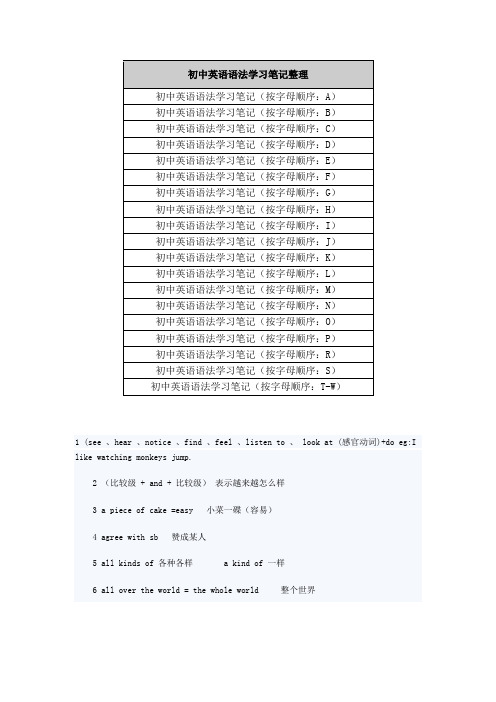
1 (see 、hear 、notice 、find 、feel 、listen to 、 look at (感官动词)+do eg:I like watching monkeys jump.2 (比较级 + and + 比较级)表示越来越怎么样3 a piece of cake =easy 小菜一碟(容易)4 agree with sb 赞成某人5 all kinds of 各种各样 a kind of 一样6 all over the world = the whole world 整个世界7 along with同……一道,伴随…… eg : I will go along with you. 我将和你一起去 the students planted trees along with their teachers. 学生同老师们一起种树8 As soon as 一怎么样就怎么样9 as you can see 你是知道的10 ask for ……求助, 向…要…(直接接想要的东西) eg : ask you for my book11 ask sb for sth 向某人什么12 ask sb to do sth 询问某人某事 ask sb not to do 叫某人不要做某事13 at the age of 在……岁时 eg:I am sixteen I am at the age of sixteen.14 at the beginning of …… ……的起初;……的开始15 at the end of +地点/+时间: 最后,尽头,末尾. eg : At the end of the day16 at this time of year 在每年的这个时候17 be /feel confident of sth /that clause +从句感觉/对什么有信心,自信 eg : I am / feel confident of my spoken English I feel that I can pass the test.18 be + doing :1 现在进行时 2 将来时19 be able to (+ v 原) = can (+ v 原)能够…… eg : She is able to sing She can sing.20 be able to do sth 能够干什么 eg :she is able to sing.21 be afraid to do (of sth 恐惧,害怕…… eg : I'm afraed to go out at nigh t I'm afraid of dog22 be allowed to do 被允许做什么 eg: I'm allowed to watch TV 我被允许看电视I should be allowed to watch TV 我应该被允许看电视23 be angry with sb 生某人的气 eg : Don't be angry with me24 be angry with(at) sb for doing sth 为什么而生某人的气25 be as…原级…as 和什么一样 eg : She is as tall as me 她和我一样高26 be ashamed to27 be away from 远离28 be away from 从……离开29 be bad for 对什么有害 eg : Reading books in the sun is bad for your eyes 在太阳下看书对你的眼睛不好30 be born 出生于31 be busy doing sth 忙于做什么事 be busy with sth 忙于……32 be careful 当心;小心33 be different from…… 和什么不一样34 be famous for 以……著名35 be friendly to sb 对某人友好36 be from = come from 来自 eg :He is from Bejing He comes from Bejing I s he from Bejing ? Does he come from Bejing ?37 be full of 装满……的 be filled with 充满 eg: the glass is full of water the glass is filled with water38 be glad+to+do/从句39 be going to + v(原)将来时40 be good at(+doing) = do well in 在某方面善长, 善于……41 be good for 对什么有好处 eg : Reading aloud is good for your English42 be happy to do 很高兴做某事43 be helpful to sb 对某人有好处 eg : Reading aloud is helpful to you 大声朗读对你有好处 Exercising is helpful to your bady 锻炼对你的身体有好处44 be in good health 身体健康45 be in trouble 处于困难中 eg : She is in trouble They are in tronble46 be interested in 对某方面感兴趣47 be late for = come late to 迟到 eg: Be late for class 上课迟到48 be like 像…… eg : I'm like my mother49 be mad at 生某人的气50 be made from 由……制成 (制成以后看不见原材料)51 be made of 由……制成(制成以后还看得见原材料)52 be not sure 表不确定53 be on a visit to 参观54 be popular with sb 受某人欢迎55 be quiet 安静56 be short for 表**的缩写 eg: 陶 is short for 陶俊杰57 be sick in bed 生病在床58 be sorry to do sth be sorry for sb eg : I am sorry for you59 be sorry to hear that60 be sorry to trouble sb eg : I am sorry to trouble you61 be strict in doing sth 严于做某事 eg : He's strict in obeying noles62 be strict with sb 对某人要求严格 eg: Some students are not strict with t hem selves 这些学生对自己不严格63 be strict with sb in sth 某方面对某人严格64 be supposed to do 被要求干什么65 be sure 表确定66 be sure of doing sth 对做某事有信心 eg: He is sure of winning I am sure of learning English well67 be sure of sth 对做某事有信心 eg: I'm sure of my head (my teacher 我相信我的大脑(老师)68 be sure that sth 对做某事有信心 eg: I'm suer that he can pass the test 我相信他能通过考试69 be sure to do sth一定会做某事eg: We are sure to pass the test 我们一定会通过这次考试 We are sure to learn English well 我们一定能学好英语70 be terrified of + 名/动doing 害怕……71 be terrified to do sth 害怕做某事72 be the same as … 和什么一样73 be used to doing sth 习惯做某事 eg: My father is used to getting up earl y 我爸爸习惯早He is used to sleeping in class 他习惯上课睡觉74 be worth doing 值得做什么75 be(feel) afraid to do sth 害怕做某事be afraid of sth 害怕某物be afraid that 从句76 because+句子 because of +短语 eg : He was late because he had a headache He was late because of his headache77 begin to do = start to do 开始做某事start…with…=begin…with… 以什么开始什么 eg : Let's begin the game with the song I begin to go home78 between…and… 两者之间79 borrow sth from sb 向……借…… lend sth to sb ( lend sb sth 借给……什么东西 eg : I borrowed a pen from him he lent a pen to me ( he lent me a pen80 both = the same(as) = not different(from) 表相同81 bother 打扰 bother sb to do sth eg : I'm sorry to bother you ,but can yo u tell me to way to the station 我十分道歉打扰你,但是你能告诉我怎么去车站 the problem has been bothering me for weeks 这个问题困扰了我几个周了 He's bothering me to lend him money82 by the end of 到……为止83 call sb sth eg : We call him old wang84 care 关心 eg : Don't you care about this country's future ?你为什么不关心国家的未来85 catch up with sb 赶上某人86 chat with sb 和某人闲谈 take sb to + 地点带某人去某地87 come in 进88 come over to 过来89 come up with 提出 eg: Can you come up with a good idea 你能想出一个好办法吗?90 communicate with sb 和某人交流91 consider + doing 考虑做什么 eg : Why not consider going to lu zhou 为什么不考虑去泸州?92 dance to 随着……跳舞 eg : She likes dancing to the music 她喜欢随着音乐跳舞93 decide to do sth 决定做某事94 do a survey of 做某方面的调查95 do better in 在……方面做得更好96 do wrong 做错97 Don't forget to do sth 不要忘了做某事98 Don't mind +doing /从句 /名词不要介意……99 each +名(单)每一个…eg : Each student has many books 每一个学生都有一些书100 end up +doing 以……结束101 enjoy +doing喜欢102 escape from 从……逃跑eg: The prisoners have escaped from the prison犯人从监狱里逃跑出来103 expect to do sth 期待做某事104 fall down 摔下来 fall off 从哪摔下来105 fall in love with sb /sth 爱上什么106 far from 离某地远 eg : The school is far from my home107 find +it +adj +to do 发现做某事怎么样108 find sb/sth +adj 发现什么怎么样 eg : I find the book interesting109 finish 完成+doing(名词)110 fit to sb = be fit for sb 适合某人111 forget to do 没有做而忘了 forget doing 做了而又忘了 eg: Don't forget to go home I forget closing door112 from…to… 从某某到某某 eg: From me to her113 get /have sth down 做完,被(别人)做…eg: I hav e my hair cut 我理了发(头发被剪了) Tom got his bad tooth pulled out 汤母把他的坏牙拔掉了(被牙医拔掉了)114 get a part-time job= find a part-time job115 get along well with sb = get on well with sb 与某人相处得好116 get along with sb = get on with sb 与某人相处117 get ready for = be ready for为什么而准备eg : I get ready for math I am ready for math118 get sb in to trouble 给某人麻119 get sb to do sth120 get…from… 从某处得到某物121 give a talk 做报告 eg: He is give a tall122 give sth to sb give sb sth 给某人某物123 go fish 钓鱼 go swimming 游泳124 go on to do 去做下一件事 go on doing 继续做这件事125 go out away from go out of126 go to school 上学(用于专业的)go to the school 去学校(不一定是上学)127 good way to 好方法128 hate to do 讨厌没做过的事 hate doing 讨厌做过的事129 have a party for sb 举办谁的晚会130 have a talk 听报告谈一谈131 have been doing 现在完成进行时 eg : You have been talking You have been sleeping since132 have been to …( 地方)……去过某过地方have gone to …(地方)去了某地还没回来133 have fun +doing 玩得高兴134 have sth to do 有什么事要做 eg: I have a lot of homework to do 我有很多家庭作业要做 I have nothing to do 我没什么事情做135 have to do sth 必须做某事136 have trouble (problem) (in) doing sth 做什么事情有麻烦137 have…time +doing138 have…(时间)…off 放……假 eg: I have month off 我请一个月得假139 hear sb +do/doing 听见某人做某事/正在做某事140 help a lot 很大用处141 help sb with sth \one's sth 帮助某人某事(某方面) help sb (to) do sth 帮助某人做某事142 hope to do sth 希望做某事143 How about(+doing) = What about(+doing)144 how do you like = what do you think of 你对什么的看法145 if : 是否=wether eg: I don't know if (wether) I should go to the p arty 我不知道我是否应该去参加晚会 He don't know if (wether) we will arrive on t ime tomorrow morning 他不知道我们明天早上是否能准时到达146 if :如果,假如(全部接一般时态)+条件语态从句 eg: I'll go to LuZ hou if it does't rain 假如明天不下雨,我就去泸州 If they change the plan they w ill let me know 假如他们要改变计划,他们会让我知道的 I'll go to England ,if I h ave enough money next year 如果我明年由足够的钱,我就要去英国147 in one's opinion = sb think 某人认为148 in some ways 在某些方面149 in the end = finally(adv) 最后150 in the north of… 什么在什么的北方(north 北 sowth 南 west 西 east 东)151 in the sun 在太阳下152 increase 增加 eg : They've increased the prece of petrol by 3% 他们把石油价增加了3%153 instead of +(名)代替 eg: I'd like an apple instead of a pear 我想要苹果,而不要梨子 I like English instead of math 我喜欢英语而不喜欢数学154 introduce sb to sb 介绍某人给某人 introduce oneself 自我介绍155 invite sb to do sth 邀请某人做某事156 It takes sb sometime to do sth 做某人花掉某人多少时间 eg : It took me 5 minutes to do my homework It takes me half an hour to cook157 It's +adj +for sb to do sth 对某人来说做某事怎么样158 It's +adj +to do 做某事怎么样159 It's +adj for sb 对于某人来说怎么样 It's +adj of sb 对某人来说太怎么样160 It's +adj(for sb) to do(对某人来说)做某事怎么样 It's +adj of sb to d o sth 对某人来说做某事太怎么样 eg : It's nice of you to help me with my English161 It's a good idea for sb to do sth 对…… 来说是个好主意162 It's important to sb 对某人来说很重要 eg: It's important to me163 It's time to do sth It's time for sth 到了该去做某事的时间 eg : It's ti me to have class It's time for class 该去上课了164 join = take part in 参加165 just now 刚才166 keep +sb /sth +adj /介词短语让什么保持什么样?167 keep out 不让…… 进入168 keep sb adj 让……保持…… eg: I want to keep my mother happy keep heal thy 保持健康169 key to +名词表示:某物的钥匙或某题的答案170 key to… anser to … key 可以是答题或钥匙171 laugh at… 取笑…… eg : Don't langh at others We langhed at the joke172 learn by oneslfe 自学173 learn from sb 向某人学习 eg: We should learn from Lei Feng174 learn to do sth 学做某事175 let sb do sth 让某人做某事176 Let sb down 让某人失望 eg : We shouldn't let our farents down 我们不应该让我们的父母失望177 live from :离某地远178 live in +大地方 /at +小地方居住在某地 eg: I live in LuZhou She lives a t XuanTan179 look after = take care of 照顾照看180 lose one's way 谁迷路 eg : Lose your way 你迷路181 make a decision to do sth 决定做某事182 make friends with sb 和谁成为朋友 eg : I want to make friends with you183 make it early 把时间定的早一点 184 make on exhibition of oneself 让某人出洋相185 make sb /n +n 使什么成为什么 eg : I made her my step moller I made you my wife186 make sb /sth +adj 使某人(某物)怎么样 eg : You must made your bed clea n187 make sb /sth adj 使某人/某物怎么样188 make sb do sth 让某人做某事 eg : I made him write 我以前让他写189 make up be made up of (被动语态)由……组成190 make…difference to…191 mind sb to do mind one's doing 介意……做什么192 most +名 most of +代193 much too +形容词194 must be 一定195 need +名词需要……196 need sb do sth 需要某人做某事197 need to do (实义动词) need do (情态动词)199 no +名词200 not anymore = no more 再也不…… eg: He didn't cry any more / He cried no more 他再也不哭201 not… (形、副)at all eg: He's not tall at all. She doesn't ju np far at all202 not…at all 一点都不203 not…either 表否定,也不 eg : I don't japanse either. I don't have sister, either 我也没有姐姐204 not…until 直到……才…… eg: I didn't sleep until my mother came back . The child didn't stop crying until I give her sugar205 offer / provide sb with sth 给某人提供206 offer sb sth / offer sth to sb 提供什么东西给某人 eg : I offer you wate r / I offer water to you 我给你提供水207 on one's way to…在去……的路上208 on the one hand 一方面 on the other hand 另一方面209 on the phone = over the phone 用电话交谈210 on time 准时 in time 及时211 one day =some day =someday 一天,将来有一天212 one of +可数名词的复数形式213 one to another 一个到另一个214 over and over again 一遍又一遍的 eg : He cleaned the floor over a nd over again215 part-time job 兼职工作 full-time job 全职工作216 pay for…付……钱 pay the bill 开钱,付钱217 please +do218 please help yourself 请随意219 be pleased with sb 对某人感到满意220 pour into 川流不息的涌入,源源而来221 practice +doing 练习做某事222 prefer sth to sth 相对……更喜欢……eg : I prefer physics to chemisty. 在物理和化学中,我更喜欢物理 pre fer doing to sth 更喜欢去做…不愿意去做…eg: He prefers riding a bike to diving .他更喜欢骑自行车,不开小车 pr efer to do sth rather than do sth 宁愿做…也不愿eg: My unde prefers to buy a now car rather than repaiv the used one. 我叔叔更喜欢买新的车,也不去修旧车。
中考英语语法 代词和限定词 笔记(全国通用)(原卷版)
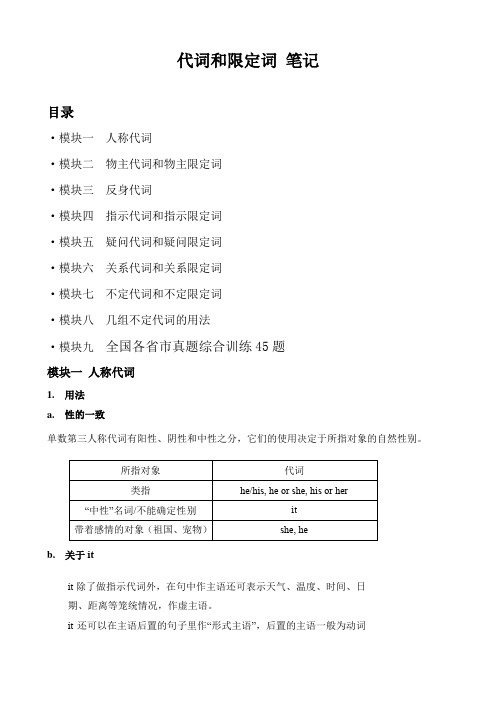
代词和限定词笔记目录·模块一人称代词·模块二物主代词和物主限定词·模块三反身代词·模块四指示代词和指示限定词·模块五疑问代词和疑问限定词·模块六关系代词和关系限定词·模块七不定代词和不定限定词·模块八几组不定代词的用法·模块九全国各省市真题综合训练45题模块一人称代词1.用法a.性的一致单数第三人称代词有阳性、阴性和中性之分,它们的使用决定于所指对象的自然性别。
b.关于itit除了做指示代词外,在句中作主语还可表示天气、温度、时间、日期、距离等笼统情况,作虚主语。
it还可以在主语后置的句子里作“形式主语”,后置的主语一般为动词不定式结构、现在分词结构和名词性从句。
★小试身手★1)Do you see that good-looking young man? is Professor Du, who comes from the star.2) A teacher should offer students challenging projects.3)I love China very much. is very beautiful.4)I have a pet dog. follows me wherever I go.5)Who is it? –It’s ( ).6)_______ illegal to drive without a license.7)_______ no use arguing with him.模块二物主代词和物主限定词★小试身手★1)My husband’s father is a doctor. ______(My/Mine) is a lawyer.I plan to enter for a summer camp with a friend of_______. (me)模块三反身代词1.形式2.用法★小试身手★填空并判断以下句中反身代词的成分:1)The queen attended the meeting. (作同位语,表强调)2)I cut shaving this morning. (作宾语)3)I could hardly believe she had made a video about water pollution by . (her) (作介词补足成分)4)Frank is not quite today. (upset or ill) (作主语补语, feel like myself(精神或身体好,not be oneself, not feel like oneself(精神或身体状态不佳))5)Just between , he is a selfish man. (固定搭配between ourselves, 你知我知)6)Those who smoke heavily should remind ________ of health, the bad smell and the feelings ofother people.a) A. theirs B. them C. themselves D. oneself3.中考常考固定搭配连线:1)help oneself to……别客气!2)enjoy oneself 过得愉快,玩得高兴3)(all) by oneself 随便取,随便吃,随便喝4)say to oneself 自言自语5)teach oneself = learn by oneself 自首6)make yourself at home. 单独地,独自地7)play with oneself 自娱自乐8)turn oneself in 自学9)find oneself 找到自我** introduce / blame oneself模块四指示代词和指示限定词1.指近还是指远1)These are new books. (These/Those)are old ones.2)Life is not easy in the US (these/those) days.3)Life was not easy in the US (these/those) days.2.指人还是指物指示代词通常指物,但在介绍人或电话交谈时,可以指人。
【中考英语复习之语法过关(牛津译林版)】课时05 谓语动词的时态 语态和主谓一致(学生版)

第五课时谓语动词的时态、语态和主谓一致动词时态历来是中考考查的重点。
动词时态考查虽多,但考向非常集中,最常考的是一般过去时和一般现在时,其次是现在完成时,其他时态考查相对较少。
因此备考重点是:①动词时态的基本用法①动词语态的基本用法①主谓一致(1)一般现在时①表示经常或习惯性的动作,多用动作动词,且常与表频率的时间状语连用。
We have meals three times a day.我们一日吃三餐。
①表示客观真理、科学事实及自然现象。
The sun sets in the west.太阳从西方落下。
①在时间、条件状语从句中常用一般现在时代替一般将来时。
I’ll write to her when I have time.有时间我会写信给她。
(2)一般过去时①表示过去发生的一次性或习惯性动作或状态。
We often played basketball together.我们(过去)经常在一起打篮球。
①时间、条件、让步状语从句中,若主句用了过去将来时,从句常用一般过去时。
He said he would tell her the news as soon as he met her.他说他一见到她就把这个消息告诉她。
(3)一般将来时①“will/shall+动词原形”表示将来某一时刻的动作或状态,即单纯的将来事实。
I shall call you as soon as I arrive.我一到就给你打电话。
They will probably go to Shanghai for their holiday.他们可能去上海度假。
①一般将来时的常用结构If you ask him, he will help you.如果你请他帮忙,他会帮助你的。
①表示一般将来时的特殊结构Look at the dark clouds.It is going to rain.看这些乌云,要下雨了。
When are you to leave/leaving for home?你什么时候回家?1.Before the sun, we need to get to the top of the mountain.A.setB.setsC.is settingD.will set2.—I don't know when he the airport tomorrow. If I get his flight number, I will let you know.—OK. Thank you.A.reachedB.will reachC.was reachingD.reaches3.—What did our geography teacher say?—She told us that the earth around the sun.A.movesB.movedC.has movedD.was moving4.—Guess what!I met Mrs. Brown in Tokyo!—Really?I she was writing a new book in her home in New York.A.will thinkB.thinkC.am thinkingD.thought5.—Don't drink wine, George. You home after the party.—OK, I won't. Thanks for your reminding.A.driveB.droveC.will driveD.have driven6.—you to ride a motorbike?—Yes. But last month I sold it and bought a car.A.Did;useB.Are;usedC.Do;useD.Did;used2.进行时态(1)现在进行时(am/is/are+现在分词)①表示说话时正在进行或发生的动作,也可表示现阶段正在进行的动作或存在的状态。
【知识】中考英语状元笔记及知识点集【精华】

初初一一年年级级((上上))★★初初一一年年级级((下下))★★【知识梳理】I. 重点短语1. a bottle of 2. a little 3. a lot (of) 4. all day 5. be from 6. be over 7. come back 8. come from 9. get down 10. go shopping 11. have a drink of 12. would like 13. get home 14. get to15. get up16. have lunch17. have supper18. listen to19. not …at all20. put …away21. take off 22. on a farm23. in a factory24. have a look25. have breakfast26. do the shopping27. throw it like that28. do one ’s homework29. in the middle of the day30. in the morning / afternoon/ eveningII. 重要句型1. Let sb. do sth.2. Could sb. do sth.?3. would like sth.4. would like to do sth.5. What about something to eat?6. How do you spell …?7. May I borrow …?III. 交际用语1. —Thanks very much!—You're welcome.2. Put it/them away.3. What's wrong?4. I think so. I don't think so.5. I want to take some books to the classroom.6. Give me a bottle of orange juice,please.7. What's your favourite sport?8. Don't worry.9.I ’m (not) good at basketball.10. Do you want a go?11. That's right./ That ‘s all right./ All right. 12. Do you have a dictionary / anydictionaries?Yes, I do. / No, I don ’t.13. We / They have some CDs.We / They don ’t have any CDs.14. ---What day is it today / tomorrow?---It ’s Monday.15. ---May I borrow your colour pens,please?---Certainly. Here you are.16. ---Where are you from?---From Beijing.17.Please give it / them back tomorrow.OK.18. ---Where are you from?---From Beijing.19. What's your telephone number in NewYork?20. ---Do you like hot dogs?---Yes, I do. ( A little. / A lot. / Verymuch.)---No, I don't. ( I don't like them at all.)21. ---What does your mother like? ---She likes dumplings and vegetables【知识梳理】I. 重点短语1. Sit down 2. on duty 3. in English 4. have a seat 5. at home 6. look like 7. look at 8. have a look 9. come on 10. at work 11. at school 12. put on 13. look after 14. get up 15. go shopping II. 重要句型1. help sb. do sth. 2. What about …?3. Let ’s do sth.4. It ’s time to do sth.5. It ’s time for …6. What ’s …? It is …/ It ’s …7. Where is …? It ’s ….8. How old are you? I ’m ….9. What class are you in? I ’m in ….10. Welcome to ….11. What ’s …plus …? It ’s ….12. I think …13. Who ’s this? This is ….14. What can you see ?I can see ….15. There is (are) ….16. What colour is it (are they)? It ’s (They ’re)…17. Whose …is this? It ’s ….18. What time is it? It ’s ….III. 交际用语1. Good morning, Miss/M r ….2. Hello! Hi! 3. Nice to meet you. Nice to meet you, too. 4. How are you? I ’m fine, thank you/thanks. And you? 5. See you. See you later. 6. Thank you! You ’re welcome.7. Goodbye! Bye! 8. What ’s your name? My name is ….9. Here you are. This way, please. 10. Who ’s on duty today?11. Let ’s do.12. Let me see. IV. 重要语法1. 动词be 的用法;2. 人称代词和物主代词的用法;3. 名词的单复数和所有格的用法;4. 冠词的基本用法;5. There be 句型的用法。
中考语法总复习 专题09 形容词和副词(下)(解析版)

中考语法总复习专题09 形容词和副词(下)命题点六形容词/副词的原级1、A.... + as + 形容词/副词原级+ as + B…. A和B一样地.....He is as excited as his younger sister.(他和他妹妹一样兴奋)Lily rode her bike as slowly as an old lady.(莉莉骑车像老太太一样慢)2、A.... not+ as/so + 形容词/副词原级+ as + B…. A不如B....He is not so / as excited as his younger sister.(他没他妹妹那么兴奋)Lily did not ride her bike so / as slowly as an old lady. (莉莉骑车不像老太太那样慢)【例1】.— Mum, could you buy me a dress like this, please? — Of course. We canbuy________one than this, but________it.A.a better; better than B.a worse; as good asC.a cheaper; as good as D.a more important; not as good as【答案】C【详解】句意“-妈妈,请你给我买一个像这样的连衣裙,好吗?-当然,我们能买一个比这个更便宜的,但是和它一样好的连衣裙”。
A:我们可以买一个比这个更好的,但是比它更好的,语义不通;B.我们可以买一个比这个更糟糕的,但是和它一样好的,语义不通;D.我们可以买一个比这个更重要的,但是没有它好的,语义不通;应该是比这个便宜,但是和它一样好的,故选C。
【例2】.(2021·广西贵港·中考真题)—Is your father strict with you? —Yes. He takes my grades as ________ as my teachers do.A.serious B.more serious C.seriously D.more seriously【答案】C【详解】句意:——你父亲对你严格吗?——是的。
2011中考英语绝密资料.doc
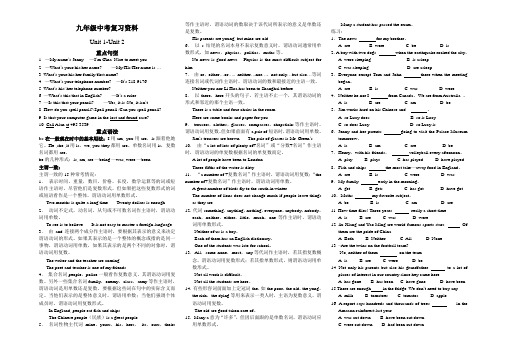
九年级中考复习资料Unit 1-Unit 2重点句型1.—My name’s Jenny. —I’m Gina. Nice to meet you.2. —What’s your/his/her name? —My/His/Her name is … .3. What’s your/his/her family/first name?4.—What’s your telephone number? —It’s 218-9176.5. What’s his/ her telephone number?6. —What’s this/that in English? —It’s a ruler.7. —Is this/that your pencil? —Yes, it is./No, it isn’t.8. How do you spell pencil?/Spell pencil./Can you spell pencil?9. Is that your computer game in the lost and found case?10. Call Alan at 495-3539.重点语法be在一般现在时中的基本用法:I用am, you用are,is跟着他她它。
He ,she ,it用is,we, you they都用are。
单数名词用is,复数名词都用are。
be的几种形式:is, am, are —being —was, were —been主谓一致:主谓一致的15种常考情况:1.表示时间,重量,数目,价格,长度,数学运算等的词或短语作主语时,尽管他们是复数形式,但如果把这些复数形式的词或短语看作是一个整体,谓语动词用单数形式。
Two months is quite a long time. Twenty dollars is enough. 2.动词不定式,动名词,从句或不可数名词作主语时,谓语动词用单数。
中考英语语法知识点总结归纳

中考英语语法知识点总结归纳一、名词。
1. 名词的数。
- 可数名词:有单复数形式。
- 规则变化:- 一般在词尾加 -s,如book - books。
- 以s, x, ch, sh结尾的名词加 -es,如box - boxes,watch - watches。
- 以辅音字母 + y结尾的名词,变y为i再加 -es,如baby - babies;但以元音字母 + y结尾的名词直接加 -s,如day - days。
- 以f或fe结尾的名词,变f或fe为v再加 -es,如knife - knives,leaf - leaves(但也有一些直接加 -s的,如roof - roofs)。
- 不规则变化:- 单复数同形,如fish(表示鱼的种类时可加 -es),sheep,deer等。
- 改变元音字母,如man - men,woman - women,foot - feet,tooth - teeth 等。
- 表示“某国人”的复数:- 中日不变,如Chinese - Chinese,Japanese - Japanese。
- 英法变,如Englishman - Englishmen,Frenchman - Frenchmen。
- 其他加 -s,如American - Americans。
- 不可数名词:没有复数形式,不能直接用数词修饰,如water,milk,bread 等。
如果要表示数量,可以用“a piece of/a glass of/a cup of +不可数名词”等结构。
2. 名词所有格。
- 有生命的名词所有格:- 一般在名词后加's,如Tom's book。
- 以s结尾的复数名词只加',如the students' classroom。
- 表示两者或多者共有时,只在最后一个名词后加's,如Lucy and Lily's room (表示两人共有的房间);表示各自拥有时,每个名词后都加's,如Lucy's and Lily's rooms(表示两人各自的房间)。
中考语法重难点总结与巩固练习
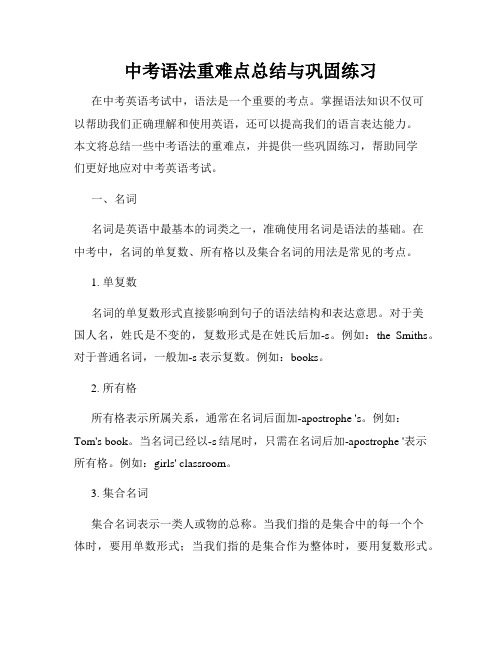
中考语法重难点总结与巩固练习在中考英语考试中,语法是一个重要的考点。
掌握语法知识不仅可以帮助我们正确理解和使用英语,还可以提高我们的语言表达能力。
本文将总结一些中考语法的重难点,并提供一些巩固练习,帮助同学们更好地应对中考英语考试。
一、名词名词是英语中最基本的词类之一,准确使用名词是语法的基础。
在中考中,名词的单复数、所有格以及集合名词的用法是常见的考点。
1. 单复数名词的单复数形式直接影响到句子的语法结构和表达意思。
对于美国人名,姓氏是不变的,复数形式是在姓氏后加-s。
例如:the Smiths。
对于普通名词,一般加-s表示复数。
例如:books。
2. 所有格所有格表示所属关系,通常在名词后面加-apostrophe 's。
例如:Tom's book。
当名词已经以-s结尾时,只需在名词后加-apostrophe '表示所有格。
例如:girls' classroom。
3. 集合名词集合名词表示一类人或物的总称。
当我们指的是集合中的每一个个体时,要用单数形式;当我们指的是集合作为整体时,要用复数形式。
例如:my family is going to the park.(指一个家庭)The audience are clapping their hands.(指观众们)练习:1. 请将以下名词从单数变为复数形式:bookboxpotatotomato2. 请用适当的所有格形式填空:This is my ______ (book)Those are _______ (girl) pens.The _______ (teacher) classroom is on the second floor.3. 选择合适的词填空:The ________ (team / teams) is practicing for the game.The ________ (family / families) are going on vacation next week.二、动词动词是句子中最为关键的词类之一,通过动词我们可以表达出各种不同的动作和状态。
中考英语语法专项复习句式精讲精练打印笔记Word版答案解析

中考英语语法专项复习---句型与句式下列各句均有一处错误,找出并改正1.The stories in that book was written many years ago.2. To read many books are good for you.3. What he said are right.4. The rich is not always happy.5. The school master and writer are coming.6. You or she go to get some water for us.7. The teacher with a lot of students come into the classroom.8. My glasses is broken.9. This pair of glasses are good.10. These kinds of butter is good.11. One of the boys are going to take part in the match.12. Half of the work are done.13. Half of the books is read.14. Each sides are full of trees.15. Both side is full of trees.16. The boys each has an apple.17. Everyone of us has a ticket for the concert.18. Girls like dancing very much,but few likes playing football.19. The number of the workers in that factory are two hundred.20. The rest of the students is here.21. The rest of the work are done.22. The news in today's newspaper are not bad.23. The Chinese is kind and friendly.24. This dictionary is too expensive for me .Ten dollars are a big sum for me25. Who are going to take part in our football match?26. What a hot weather it is!27. We have to sing this,have we?28. I want to know where does he live.29. - I haven't got a ticket for the football match - Nor I have.30. Look! Here the bus comes!31. Look! Here comes he!32. Do you want Mary to go to the cinema with us? No,I don't hope so.33. That is difficult for us to learn English well.答案与解析1.[误]The stories in that book was written many years ago[正]The stories in that book were written many years ago.作主语的名词、代词或不定式、动名词,它们往往要带有修饰词,这些词可能是形容词,也可能是短语,但谓语动词还是要取决于这个主语的数,要记住的是一个名词不可能在同一句中作两个不同的语法成份,如:book 作了of 的介词宾2.[误]To read many books are good for you.[正]To read many books is good for you.[析]不定式作主语应该看作单数主语。
中考英语总复习笔记(超级给力)
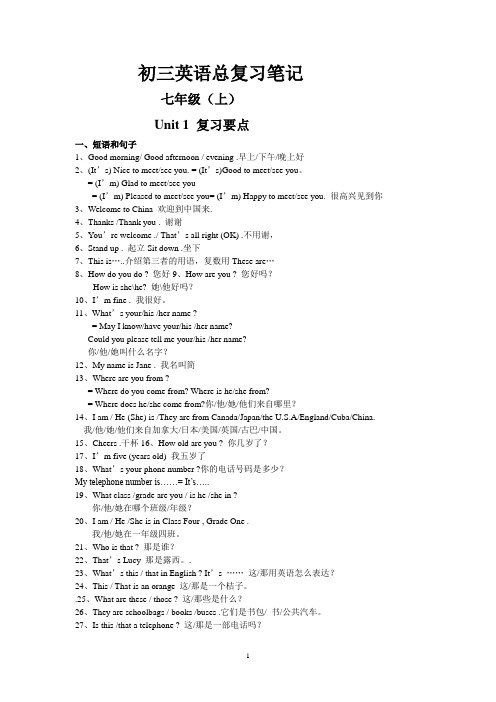
初三英语总复习笔记七年级(上)Unit 1 复习要点一、短语和句子1、Good morning/ Good afternoon / evening .早上/下午/晚上好2、(It’s) Nice to meet/see you. = (It’s)Good to meet/see you。
= (I’m) Glad to meet/see you= (I’m) Pleased to meet/see you= (I’m) Happy to meet/see you. 很高兴见到你3、Welcome to China 欢迎到中国来.4、Thanks /Thank you . 谢谢5、Y ou’re welcome ./ That’s all right (OK) .不用谢,6、Stand up . 起立Sit down .坐下7、This is…..介绍第三者的用语,复数用These are…8、How do you do ? 您好9、How are you ? 您好吗?How is she\he? 她\他好吗?10、I’m fine . 我很好。
11、What’s your/his /her name ?= May I know/have your/his /her name?Could you please tell me your/his /her name?你/他/她叫什么名字?12、My name is Jane . 我名叫简13、Where are you from ?= Where do you come from? Where is he/she from?= Where does he/she come from?你/他/她/他们来自哪里?14、I am / He (She) is /They are from Canada/Japan/the U.S.A/England/Cuba/China. 我/他/她/他们来自加拿大/日本/美国/英国/古巴/中国。
(word完整版)中考英语语法知识点总结,文档

中考英语语法知识点总结:名词名词复数的特殊变化。
普通名词的复数我们知道是直接加-s或-es,a.class,box,watch,brush等词以s,x,ch,sh,结尾,复数要加-es;b.story,factory等以"辅音字母+y"结尾的词复数要先将-y变成-i再加-es;c.knife,wife,life等以-f 或-fe结尾的词一般先将-f或-fe变为-v,再加-es;d.以-o结尾的名词,一般来说,末尾是"元音字母+o"的词加-s,我们学过的有radio,zoo。
末尾是"辅音字母+o"的词,变复数加-es。
如:tomato,hero,potato,当然其中的piano和photo,又是一个例外,他们的结尾只能加-s。
e.child(children),foot(feet),tooth(teeth),mouse(mice),man(men),woman(women)等词的复数变化全不遵循规那么。
注意:与man和woman构成的合成词,其复数形式也是-men和-women。
如:anEnglishman,twoEnglishmen.但German不是合成词,故复数形式为Germans;f.deer,sheep等词单复数同形。
people,police,cattle等词,以单数形式出现,但实为复数,所以它们的谓语当然也是复数形式,这就是集体名词。
theEnglish,theFrench,theChinese等名词表示国民总称时,也作复数用。
注意:maths,politics,physics等学科名词,虽然以-s结尾,仍为不可数名词。
还有theUnitedStates(美国),theUnitedNations(联合国)等应视为单数。
别奇怪,名词有时也可以作定语的。
它作定语时一般用单数,但也有以下例外。
a.man,woman等作定语时,它的单复数以其所修饰的名词的单复数而定。
中考英语重点知识归纳笔记

中考英语重点知识归纳一.1、as…as…结构:你和汤姆是一样好的孩子。
You’re a boy as good as Tom.=You’re as good a boy as Tom.2、(1)too…to与so…that sb. can’t…的句型转换:前者为简单句,主语只有一个,而后者为复合句,主语有两个,试比较:The man was too angry to be able to speak.The man was so angry that he wasn’t able to speak.(2) too…to…与not enough to句型的转换:He is too young to get married.=He is not old enough to get married.The book is too difficult for me to read.=The book is not easy enough for me to read.3、形容词原级表示比较级含义:约翰不象迈克那么苯。
John is not so stupid as Mike.John is less stupid than Mike.John is cleverer than Mike.4、用比较级表示最高级:约翰是班里最高的男生。
John is taller than any other boy in the class.John is the tallest boy in the class.5、the more….. the more….表示“越……越……”:The more books you read, the wider your knowledge is.The more food you eat, the fatter you are.6、more and more….表示“越来……越……”:More and more students realized the importance of a foreign language.Our country is getting stronger and stronger.1. after, in这两个介词都可以表示“……(时间)以后”的意思after 以过去为起点,表示过去一段时间之后,常用于过去时态的句子中?如:She went after three days. 她是三天以后走的in 以现在为起点,表将来一段时间以后,常用于将来时态的句子中如:She will go in three days. 她三天以后要走2. how long, how often, how soonhow long指多长时间,主要用来对一段时间(如three days, four weeks 等)提问?如:How long ago was it? 这是多久前的事了?how often指每隔多久,主要用来对频率副词或状语(如once a week等)提问?如:—How often does he come here? —Once a month. 他(每隔)多久来一次?每月一次。
- 1、下载文档前请自行甄别文档内容的完整性,平台不提供额外的编辑、内容补充、找答案等附加服务。
- 2、"仅部分预览"的文档,不可在线预览部分如存在完整性等问题,可反馈申请退款(可完整预览的文档不适用该条件!)。
- 3、如文档侵犯您的权益,请联系客服反馈,我们会尽快为您处理(人工客服工作时间:9:00-18:30)。
初三英语总复习笔记七年级(上)Unit 1 复习要点一、短语和句子1、Good morning/ Good afternoon / evening .早上/下午/晚上好2、(It’s) Nice to meet/see you. = (It’s)Good to meet/see you。
= (I’m) Glad to meet/see you= (I’m) Pleased to meet/see you= (I’m) Happy to meet/see you. 很高兴见到你3、Welcome to China 欢迎到中国来.4、Thanks /Thank you . 谢谢5、You’re welcome ./ That’s all right (OK) .不用谢,6、Stand up . 起立Sit down .坐下7、This is…..介绍第三者的用语,复数用These are…8、How do you do ? 您好9、How are you ? 您好吗?How is she\he? 她\他好吗?10、I’m fine . 我很好。
11、What’s your/his /her name ?= May I know/have your/his /her name?Could you please tell me your/his /her name?你/他/她叫什么名字?12、My name is Jane . 我名叫简13、Where are you from ?= Where do you come from? Where is he/she from?= Where does he/she come from?你/他/她/他们来自哪里?14、I am / He (She) is /They are from Canada/Japan/theU.S.A/England/Cuba/China.我/他/她/他们来自加拿大/日本/美国/英国/古巴/中国。
15、Cheers .干杯16、How old are you ? 你几岁了?17、I’m five (years old) 我五岁了18、What’s your phone number ?你的电话号码是多少?My telephone number is……= It‘s…..19、What class /grade are you / is he /she in ?你/他/她在哪个班级/年级?20、I am / He /She is in Class Four , Grade One .我/他/她在一年级四班。
21、Who is that ? 那是谁?22、That’s Lucy 那是露西。
.23、What’s this / that in English ? It’s ……这/那用英语怎么表达?24、This / That is an orange 这/那是一个桔子。
25、What are these / those ? 这/那些是什么?26、They are schoolbags / books /buses .它们是书包/ 书/公共汽车。
27、Is this /that a telephone ? 这/那是一部电话吗?28、Yes, it is.\ No, it isn’t.29、Are these /those pencils ?这些是铅笔吗?30、Yes, they are.\No, they aren’t.31、How do you spell it 你是怎么拼写它的?M—A—P, map.32、Can you spell it? Yes, M—A—P, map.33、Excuse me . 请问,打扰了34、in the same class 在相同的班级35、good friend 好朋友36、.Mr. Mrs Miss Ms 用于姓之前(Mr. 表示先生,是对中年男子的尊称,婚否不限;Mrs 表示夫人,是对中年已婚女子的称呼:Ms,是对不知婚否女子的称呼;Miss 是对未婚女子或老师的称呼)语法1、be 中am、is、are 的基本用法,区别及其引导的一般疑问句和回答.am 接在I 之后,is 放在单数的名词或代词之后,are 放在复数的名词或代词之后,否定句在be 后加not,一般疑问句将be 提前。
回答:Yes,人称代词+ be./ No, 人称代词+be + not.He is Mr. Chen. He is not Mr. Chen.Is he Mr. Chen? Yes, he is. / No, he is not.I am a student. I am not a student.Are you a student? Yes, I am. / No, I am not.They are teachers. They are not teachers.Are they teachers? Yes, they are. / No, they are not.2.名词的复数:1)一般在名词词尾加—s car---cars; apple--apples2)以s,x,ch,sh 结尾的词,在词尾加---es,如:box---boxes; bus---buses;watch ---watches.3)部分国人的复数:以an 结尾的单词,在词尾加—s;以结尾的单词,单复数同形。
如:Chinese---Chinese, Japanese---Japanese, American---Americans Brazilian—Brazilians, Canadian---Canadians.3)以辅音字母+y 结尾,变y 为i 再加es,如:family---families. 5)以fe、f 结尾,变fe、f 为ve 再加s,如:life---lives. 6)特殊情况,如:mouse---mice;foot---feet,tooth--teeth, Chinese--Chinese, Japanese--Japanese3. 基数词的表达:0—100 zero one two three four five six seven eight nine ten eleven twelvethirteen fourteen fifteen sixteen seventeen nineteen twenty twenty-one thirty …forty…fifty…sixty…4. a,an,the 的用法: a /an 都表示“一,一个”,如果单词的音标是元音音标开始的,我们在前用an, an apple / a ‘u’;/ an ‘s’Unit 2 LookingDifferentTopic 1small - big / large / wide long – short black – white tall - short young – old new - old1. a small nose 一个小鼻子2. a big head 一个大头3. long\short hair 长/短头发4. a wide mouth 一个大嘴巴5. round faces 圆脸6. your favorite movie star 你最喜爱的电影明星7. guess again 再猜8. a good student 一个好学生9. have a sister 有一个姐妹10. her/his name 他/她的名字11. in the same school 在同一所学校12. in different grades 在不同的年级13. Yourface is long . = 14. His hair is short. =15. Do you have long hair? Yes, I do. No, I don‘t.Yes, we do. No, we don‘t.16. Does she / he have big eyes?Yes, she / he does. No, she / he doesn‘t.17. Do they have new friends?Yes, they do. No, they don‘t.10. I know. 我知道I don’t know. 我不知道。
I see.我明白11. I‘m thirteen years old. = I‘m 13 years old.= I‘m 13. = I‘m thirteen. Topic21. What does she look like? 她看起来怎么样?2. that boy 那个男孩3. my friend 我的朋友4.look the same=have the same looks 看起来一样5. look different =have different looks 看起来不一样6. blond hair and blue hair 金发碧眼7. good friend 好朋友8. 表示颜色的词语:What’s 颜色and 颜色? It’s……9. 关于颜色的提问:What color…?-- What color is the skirt? -- It‘s white. -- What color are the shirts? - They are white.10. give something to somebody= give somebody something给某人某物Give the book to Maria = Give Maria the book. 把书给Maria.11. short brown hair 12. look at the photo\ picture 看着这张照片13. look (at) = have a look (at)14. the girl in yellow = the girl in a green skirt15. in 可表示“用某种语言在…..里面,穿着”in English in the morning \ afternoon \ evening in a green car in a red coat in red16. which 疑问词的使用Which girl? The girl in red. 哪个女孩?穿红色衣服的那个女孩。
17.Which bag? The blue one. 哪个包?蓝色那个。
18. 区别has/have 与am/is/are 的用法:has/have 表示“有”,即“某人有某物”,am/is/are 表示“是”即“…是…”19. 有实意动词的一般现在时态的用法:动词原形——第三人称单数形式1)直接加“s”,如:make----makes; come----comes.2)动词以o,s,ch,sh,x 结尾,再后加“es”,如:do---does; watch----watches; wish---wishes; mis s----misses; guess----guesses 3)特殊情况,如:have----has;4)辅音字母+y,把y 改为i,加—es, 如:Study---studies20. 句型转换:1)主语为第三人称单数,否定句,在动词前加doesn`t,再把动词改回原形,一般疑问句,在句首加does,再把动词改回原形,回答,Yes,人称代词+does。
